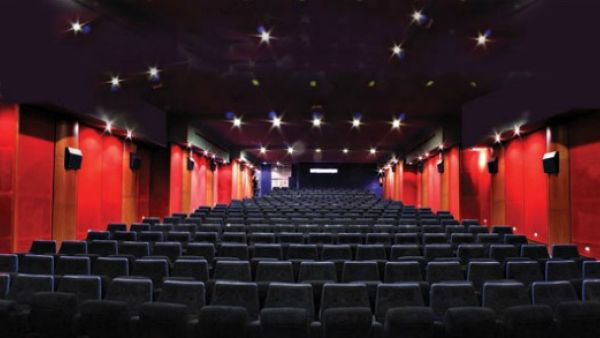Hania Mroué’s brows furrow as she stares into her Blackberry. An SMS message on the mobile phone in her other hand has just delivered bad news about the whereabouts of a 35mm film reel.
The reel was shipped to the courier’s Dubai hub before being transhipped back to Lebanon, a week late. Here further administrative hurtles – Customs, the censorship office of General Security – still stand between it and the projection room.
“We’ve been very fortunate with General Security,” Mroué smiles at her Blackberry and touches wood. “So far.”
The mobile phone and the Blackberry will interrupt this conversation a few times, but never derail it completely. It’s an apt metaphor for the Metropolis Art Cinema. Celebrating its fifth anniversary this month, Mroué’s cinema was born on 11 July, 2006 with a selection from that year’s Semaine de la Critique.
The challenges facing the cinema’s 2006 opening were more troubling than a missing film. The next day the Israeli air force began pummelling Lebanon with 34 days of air and sea attacks, displacing a million Lebanese and killing over 1,200 more. Hamra’s Masrah al-Madina, the cinema’s original home, became an ad hoc squat for the displaced South Lebanese families.
Given the inhospitable environment, the fifth anniversary of Metropolis – a cinema specializing in non-commercial films from Lebanon, the region and the world – is quite an accomplishment.
“We’re still trying,” Mroué smiles. “We’re still planning for the coming five years as if we’re starting new.”
Though its films are a little more challenging than commercial fare, Metropolis operates like a commercial cinema, keeping a regular program of films on its two screens.
The cinema has also hosted an array of classic film retrospectives – Antonioni, Bresson, Fellini, Tati et al – complemented by high-profile screening cycles of new and historic works.
The cinema has become a hub for festivals devoted to screening new and independent cinema from Lebanon and the region – Ayyam Beirut al-Cinema’iyya and the Beirut International Film Festival, to name a couple. A range of cine-concerts paired classic works with cutting-edge artists, like Rami and Bachar Khalifé’s 2008 accompaniment of F.W. Murnau’s “Faust.”
The project has faced a myriad of other obstacles since the 2006 war.
“The problem is that all the obstacles are connected,” Mroué says. “Political instability effects financing. The 2006 war was one disaster and the financial crisis another, because we were relying on European institutions, which all had budget cuts. In those parts of the Arab world where there is stability and money, the Gulf, they’re not interested in what we’re doing.”
With locally generated private funding and sponsorship difficult to secure because of the country’s political situation, the box office has become a major source of funding.
“I have no problem with that,” Mroué says. “From the beginning I thought that if this cinema cannot attract enough people to sustain itself, then it shouldn’t exist. But we all know how tricky it is to rely on the box office. We don’t want to show commercial films but at the same time the box office is our main revenue.
“So we started approaching philanthropists, which was very helpful in helping us save the cinema last year. We don’t know if we’ll be able to do the same this year.”
The elephant in the room when talking with members of Lebanon’s arts organisations is the role of the ministry of culture in aiding their work.
“The only relationship we have with our government is through censorship or the ministry of interior – because you have to have your legal papers in order,” Mroué shrugs. “We owe them everything. They owe us nothing.
“This saves us from being dependent on something that doesn’t exist – because in Lebanon you can live six months or a year without a government. But this is very dangerous and it shouldn’t be accepted. It’s our right to keep requesting more attention and support, financial or otherwise. The problem is that we’re not requesting this support anymore because … I no longer have the courage to waste time.
“We are in dire need of a minister of culture who’s really present and supportive and at least knows what we’re doing and maybe can protect us if we have problems with other ministries or state institutions.
“It’s like they’re teaching us how to forget about the Ministry of Culture – the way they did state television – and slowly, maybe in 10 years, they’ll tell us, ‘Okay, we’re gonna eliminate this ministry.’ And nobody’s going to care. This is very dangerous.”
A major obstacle facing Metropolis is the sheer expense in shipping independent film in professional-quality formats when the distribution regime for this work is structured around film festivals, not cinemas. Distribution is still a problem, Mroué says, but one that has become slightly more manageable with the years.
“We’re in a bigger cinema now,” she said. “Now I think distributors take us more seriously. They also understand how we’re different … understanding that we’re very selective, that we leave the films on screen longer, that we help with the promotion.
“The other thing that made it easier is that we created our own distribution company, MC Distribution. So for those films that are too difficult or not commercial, we take the rights and we take the risks.
One of Mroué’s declared motives in launching Metropolis was to provide Beirut audiences with some cinema choice – like those available to people living in European cities. Five years on, the cinema’s greatest accomplishment, as far as she’s concerned, has been in attaining audience trust.
“That’s the thing that makes us proud,” she grins. “That’s extremely important. It’s also a burden, because it’s not allowed to fail anymore.
“It’s important that the space has become part of the fabric of the city, that people know. It’s like knowing Hamra is there, even if you don’t go. It’s important we’re not imposing, that we’ve become part of the life of the city.
The cinema has also sought to build its audience, starting with two kids’ projects. “College au Cinema” has more than 3,500 kids come to the cinema three times a year to watch films with their teachers and to discuss them.
“My only reservation is that I wanted to extend this project to public schools but this requires funding.”
“Magic Lantern,” the other project, “has been successful but it’s still the first year. The parents at first didn’t understand the process very well. It’s a cine club where parents aren’t allowed,” he laughs. “It’s amazing how the child’s behavior changes when his mother isn’t there. He enjoys the screening and he participates in the animation before and the discussion afterward, just like any other adult.
“I think it will take some time for us to convince the parents that this it’s important to take them to the cinema, as important as giving them piano lessons, or dance or sport activities. It’ll take time, but that’s okay,” Mroué smiles again. “If we’re still here, we have time.”
By By Jim Quilty








